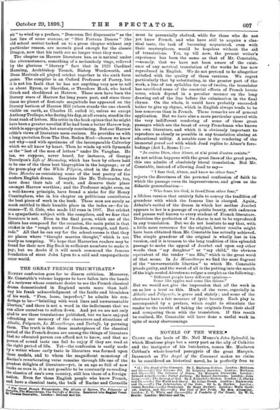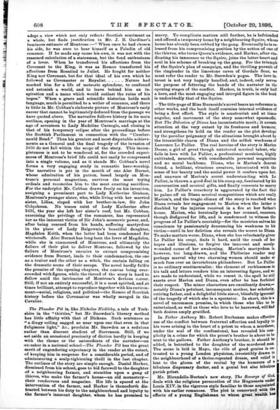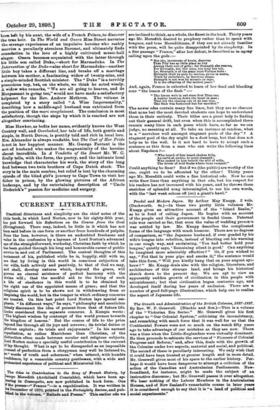NOVELS OF THE WEEK.* CLOSE on the heels of Mr.
Neil Munro's John Splendid, in which Montrose plays but a sorry part as the ally of Colkitto and the instigator of his butcheries, comes Mr. Maclaren Cobban's wholehearted panegyric of the great Marquis. Inasmuch as The Angel of the Covenant makes no claim to be considered an historical novel, he is perfectly free to
• (1) The Angel of the Covenant. By J. Maolaren Oobban. London : Methuen and Co.—(2.) The Plunder Pit. By Keighley Snowden. London; Methuen. and 0o.—(8.) The Delusion of Diana. By Margaret Burnside. London r Edward Arnold.—(4.) Father Anthony. By Robert Buchanan. London : John Long.—(5 ) The Scourge of God. By J. Bionadelle-Burton. London : J. Clarke and 00.—(8.) The World and (More. By Lilian Street. London : Duckworth and Co.—(7.) The Intervention of the Duke. By L. A. Harker. London r. James Bowden.—(8.) Overlooked. By Beaty Hawker. London With Hard- ier, Dorton, and 0o.—(9.) The Coat of Her Pride. By Mrs Alexander. London: F. V. White and Co.—(10.) A Vendetta of the Desert. By W. Os licalls. Laudon; Methuen sad On, adopt a view which not only reflects Scottish sentiment as a whole, but finds j Ratification in Mr. J. R. Gardiner's luminous estimate of Montrose :—" When once he had chosen his side, he was sure to bear himself as a Paladin of old romance. If he made any cause hie own, it was not with the reasoned calculation of a statesman, but the fond enthusiasm of a lover. When he transferred his affections from the Covenant to the King, it was as Romeo transferred his affections from Rosalind to Juliet. He fought for neither King nor Covenant., but for that ideal of his own which he followed as Covenanter or Royalist Nature had marked him for a life of meteoric splendour, to confound and astonish a world, and to leave behind him an in. spiration and a name which would outlast the ruins of his hopes." When a grave and scientific historian holds such language, much is permitted to a writer of romance, and there is little in Mr. Cobban's elaborate picture of Montrose's early career that cannot be legitimately deduced from the passage we have quoted above. The narrative follows history in its main outlines, opening in the year of Montrose's marriage at the age of seventeen to Lady Madeline Carnegie, and closing in that of his temporary eclipse after the proceedings before the Scottish Parliament in connection with the " Cumber- nauld Bond." Thus his greatest and most disputable achieve- ments as a General and the final tragedy of the invasion of 1650 do not fall within the scope of the story. This incom- pleteness is not to be wondered at, for the crowded experi- ences of Montrose's brief life could not easily be compressed into a single volume, and as it stands Mr. Cobban's novel forms a very engaging study in romantic hero-worship. The narrative is put in the month of one Alec Burnet, whose admiration of his patron, based largely on Mon- trose's personal magnetism, survives the most trying ordeals and reconciles him to the most exacting sacrifices. For the underplot Mr. Cobban draws freely on his invention, assigning a prominent part to Lady Katherine Graham, Montrose's younger sister, who, while living with her married sister, Lilias, eloped with her brother-in-law, Sir John Colqnhoun. No traces exist of Lady Katherine after 1631, the year she left her sister's roof, but Mr. Cobban, exercising the privilege of the romancer, has represented her as the innocent victim of Sir John's mesmeric power, and, after being rescued from his hands, suffering martyrdom in the place of Lady Balgownie's beautiful daughter, Magdalen Keith, when the latter had been condemned for witchcraft. Alec Burnet has long been the lover of Magdalen, while she is enamoured of Montrose, and ultimately the failure of their plot to deliver Montrose, followed by the 'failure of Montrose's enemies to extract compromising .evidence from Burnet, leads to their condemnation, the one as a traitor and the other as a witch, the curtain falling on the dramatic scene of their escape. The novel hardly fulfils the promise of the opening chapters, the canvas being over- crowded with figures, while the thread of the story is hard to follow amid the intricacies of Montrose's devious career. Still, if not an entirely successful, it is a most spirited, and at times brilliant, attempt to reproduce together with his environ- ment—social, religions, and political—the Romeo of Scottish history before the Covenanter was wholly merged in the Cavalier.
The Plunder Pit is, like Nicholas Nickleby, a tale of York- shire in the " thirties," but Mr. Snowden's literary method has little affinity with that of Dickens. Such sentences as "a dingy ceiling sagged so near upon one that even in that fuliginous light," &c., proclaim Mr. Snowden as a sedulous rather than discreet student of Stevenson. Still, if we set aside an occasional preciosity of diction hardly in keeping with the theme or the antecedents of the narrator—an -ex-usher in a national school—The Plunder Pit has the great merit of engendering expectancy in the reader at the outset, of keeping him in suspense for a considerable period, and of administering a scalp-tightening thrill in the last chapter. The outlines of the story are simple enough. Daniel Harker, dismissed from his school, goes to bid farewell to the daughter of a neighbouring farmer, and stumbles upon a gang of thieves, who make the farmer's house—an old monastery— their rendezvous and magazine. His life is spared at the Intervention of the farmer, and Harker is thenceforth dis- tracted between his duty to the neighbourhood and loyalty to the farmer's innocent daughter, whom he has promised to marry. To complicate matters still further, be is befriended and offered a temporary home by a neighbouring Squire, whose house has already been robbed by the gang. Eventually heir re- leased from his compromising position by the action of one of the thieves, who turns Queen's evidence, and Harker, after viz. dicating his innocence to the Squire, joins the latter heart and soul in his scheme of breaking up the gang. For the triumph of the Squire's plan of campaign, and the thrilling pursuit of the ringleader in the limestone caves of Gordale Scar, we must refer the reader to Mr. Snowden's pages. The love in- terest is not very happily handled, and, indeed, only serves the purpose of fettering the hands of the narrator in the opening stages of the conflict. Harker, in truth, is only half a hero, and the most engaging and intrepid figure in the book is undoubtedly that of the Squire.
• The title-page of Miss Burneside's novel bears no reference to other works, and the book itself contains internal evidence of being a first effort. The style is amateurish and at times angular, and movement of the story somewhat spasmodic, But The Delusion of Diana has incontestable merit ; it arrests attention at the very outset by its freshness and humour, and strengthens its hold on the reader as the plot develops by the peculiar poignancy of the situations brought about by the irresistible charm of Diana and the selfish weakness of Laurence Le Pallier. The real heroine of the story is Marion Deane, a girl of great though untutored musical talent, who falls in love with Le Pallier, a professional musician, highly cultivated, neurotic, with considerable personal magnetism and no moral backbone. Diana, who is Marion's dearest friend, a brilliant, vivacious creature, intoxicated with the sense of her beauty and the social power it confers upon her, and unaware of Marion's secret understanding with Le Pallier, is thrown a good deal in his comp my, fascinated by his conversation and musical gifts, and finally consents to marry him. Le Pallier's treachery is aggravated by the fact that he palms off on Diana musical compositions which are really Marion's, and the tragic climax of the story is reached when Diana reveals her engagement to Marion when the latter is disabled by the injuries received in a fire at her father's house. Marion, who heroically keeps her counsel, recovers, though disfigured for life, and is condemned to witness the progress of Le Pallier's courtship—for the musician salves his conscience by passionately denouncing his weakness to his victim—until in her delirium she reveals the secret to Diana. To make matters worse, Diana, when she has reluctantly given Le Pallier his conga, finds it hard, amid the crash of het hopes and illusions, to forgive the innocent and sorely. wounded cause of her awakening. Marion's martyrdom is, however, too long-drawn, and the Philistine reader may perhaps marvel why two charming women should make so much fuss over an invertebrate philanderer. But Le Pam is no ordinary sentimentalist : the element of recklessness in his talk and letters renders him an interesting figure, and we are made to understand, while we resent it, the spell he still exerts over Marion and Diana, even after he has forfeited their respect. The minor characters are excellently drawn,— notably Diana's petulant, inconsequent mother, her scholarly, retiring father, and a delightful little sister, blissfully ignorant of the tragedy of which she is a spectator. In short, this is a novel of uncommon promise, in which those who like to be entertained, as well as those who love to be harrowed, will find both desires amply gratified.
In Father Anthony Mr. Robert Buchanan makes effective use of the conflict between fraternal affection and loyalty to his vows arising in the heart of a priest to whom a murderer, under the seal of the confessional, has revealed his coin• plicity in a crime for which the priest's brother is about to be sent to the gallows. Father Anthony's brother, it should be added, is betrothed to the daughter of the murdered man. The scene is laid in Mayo, the role of good genius is en• trusted to a young London physician, irresistibly drawn to the neighbourhood of a thrice-repeated dream, and relief is lent to the gloom of the recital by the humours of a bibulous dispensary doctor, and a genial but also bibulowi parish priest. Mr. Bloundelle-Burton's new story, The Scourge of God, deals with the religions persecution of the Huguenots ender Louis XPir. in the vigorous style familiar to those acquainted with his earlier romances. The plot is concerned with the efforts of a young Englishman to whom great wealth boo been left by his aunt, the wife of a French Prince, to discover the true heir. In The World and Onora Miss Street narrates the strange experiences of an impulsive heroine who rashly marries a peculiarly atrocious Baronet, and ultimately finds consolation in the love of a highly cultivated music-hall singer. Onora becomes acquainted with the latter through his little son called Duke,—short for Marmaduke. In The Intervention of the Duke—also short for Marmaduke—another little boy takes a different line, and breaks off a marriage between his mother, a fascinating widow of twenty-nine, and a simple-minded Scottish minister. The " Duke "is a terribly precocious boy, but, on the whole, we think he acted wisely. A widow who remarks, " We are all going to heaven, and de Manpassant is going too," would not have made a satisfactory helpmeet for the Rev. Andrew Methven. The volume is completed by a story called " A Wise Impersonality," describing how a middle-aged husband was extricated from the position of the maxi complaisant. The conclusion is most satisfactory, though the steps by which it is reached are not altogether convincing.
Miss Hawker, as befits her name, evidently knows the West Country well, and Overlooked, her tale of life, both gentle and simple, in North Devon, is prettily told and rich in local lore. Mrs. Alexander is always readable, but The Cost of Her Pride is not in her happiest manner. Mr. George Farrant is the sort of husband who makes the magnanimity of the heroine almost incredible. In A Vendetta of the Desert Mr. W. C. Scully tells, with the force, the poetry, and the intimate local knowledge that characterise his work, the story of the long feud between two twin brothers of Cape Dutch stock. The story is in the main sombre, but relief is lent by the charming episode of the blind girl's journey to Cape Town to visit her father in prison, by the glowing pictures of the African landscape, and by the entertaining description of "Uncle Diederick's" passion for medicine and surgery.








































 Previous page
Previous page